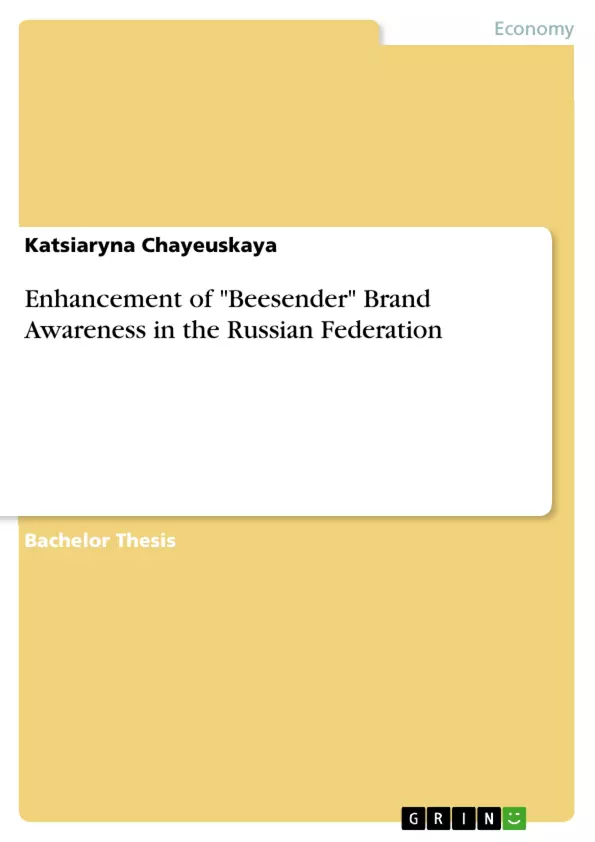Research problem: Beesender is a process-driven communication platform that just entered the Russian market. At the moment, there is a diversity of different brands presented in the Russian software industry, but no one from the competitors has a similar product as a Beesender, which serves the same customer needs. Customers used to trust companies that well established rather than try something new. The aim of the thesis is to identify the best ways that would help to enhance brand awareness among potential Russian customers for 2018.
Research objectives: 1. To conduct an internal and external analysis of the CRM Project company and its product Beesender in the Russian market. 2. To conduct quantitative research for the understanding of the most relevant existing problems that Beesender faces among potential customers in the Russian market. 3. To provide the managerial solutions of how to enhance brand awareness of Beesender brand in Russian Federation.
Research results: After the research finding was analyzed, managerial solutions have been provided for brand awareness enhancement of “Beesender” in the Russian market.
Inhaltsverzeichnis (Table of Contents)
- Introduction
- Situation Analysis
- Internal Analysis
- Marketing Mix: 4 P's
- External Analysis
- PESTEL Analysis
- Market Segmentation and Customer Analysis
- Competitor's Analysis
- SWOT Analysis
- Theoretical framework
- Empirical research
- Research aim and objectives
- Research theoretical framework
- Research method and data collection method
- Research samples and sampling procedure
- Research instruments explanation
- Data analysis methods
- Managerial solutions
Zielsetzung und Themenschwerpunkte (Objectives and Key Themes)
This thesis investigates the enhancement of brand awareness for "Beesender," a communication platform, within the Russian market. The research aims to identify the best strategies for increasing brand recognition and recall among potential Russian customers for the year 2018. The thesis conducts both internal and external analyses of "Beesender" and its parent company within the Russian software industry. The research also utilizes quantitative data to understand the challenges "Beesender" faces in the market and to provide managerial solutions for improving brand awareness.
- Brand awareness enhancement strategies for a new market entry
- Internal and external analysis of a communication platform within the Russian software industry
- Quantitative research to identify consumer perceptions and challenges
- Managerial solutions for improving brand recognition and recall
- The role of omnichannel communication in building brand awareness
Zusammenfassung der Kapitel (Chapter Summaries)
The introduction sets the stage for the thesis, introducing the research problem and objectives. It highlights the importance of building brand awareness for "Beesender" in the competitive Russian market. The situation analysis section delves into both the internal and external factors affecting "Beesender." Internal analysis focuses on the company's resources, capabilities, and marketing mix, while external analysis examines the PESTEL environment, market segmentation, customer analysis, competitor analysis, and the company's SWOT profile. The theoretical framework chapter provides a foundation for the research, introducing relevant concepts related to brand awareness and omnichannel communication. The empirical research chapter outlines the research methodology, data collection methods, sampling techniques, and data analysis approaches. The research aims to gain insights into customer perceptions of "Beesender" and identify the most effective strategies for enhancing brand awareness. Finally, the managerial solutions section presents a detailed plan of action for boosting brand awareness for "Beesender" in the Russian market.
Schlüsselwörter (Keywords)
The main keywords for this thesis are: brand awareness, brand recognition, brand recall, omnichannel communication, chatbots, Russian market, CRM, software industry.
Frequently Asked Questions
What is Beesender?
Beesender is a process-driven communication platform and chatbot solution that entered the Russian market in 2018.
What was the main goal of this thesis?
The goal was to identify the best ways to enhance brand awareness for Beesender among potential customers in the Russian Federation.
What challenges did Beesender face in Russia?
Customers often trust well-established brands more than new entries, and there was a need to differentiate Beesender from existing software competitors.
What research methods were used?
The thesis used internal and external situational analysis (PESTEL, SWOT, 4Ps) and quantitative research to understand customer problems.
What are the key themes of the managerial solutions?
Solutions focus on improving brand recognition and recall through omnichannel communication and strategic market positioning.
- Citation du texte
- Katsiaryna Chayeuskaya (Auteur), 2018, Enhancement of "Beesender" Brand Awareness in the Russian Federation, Munich, GRIN Verlag, https://www.grin.com/document/428600



